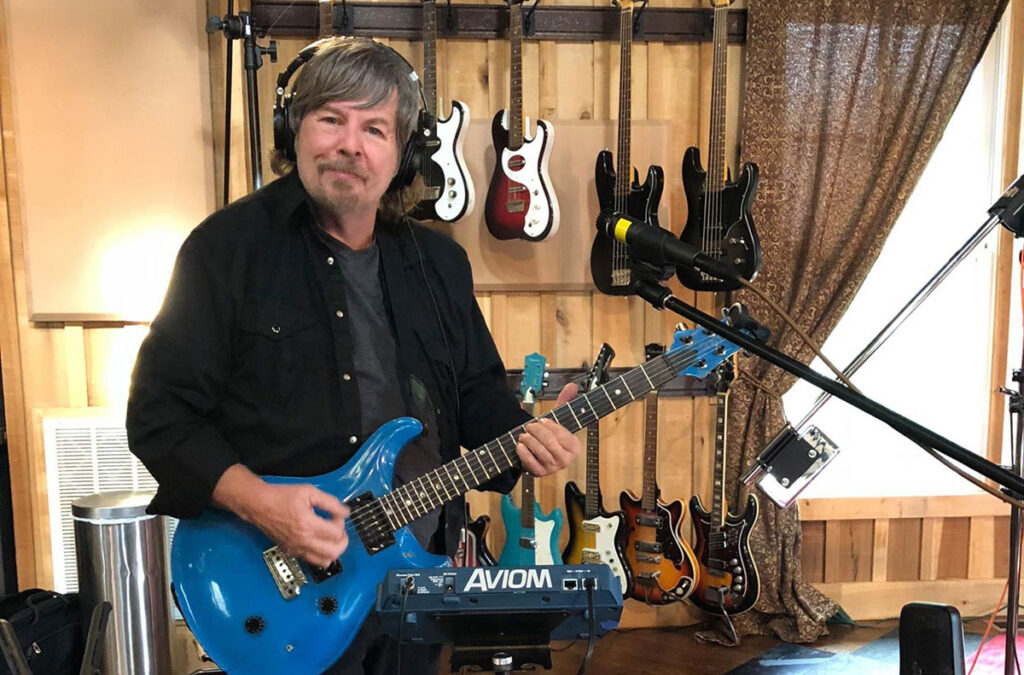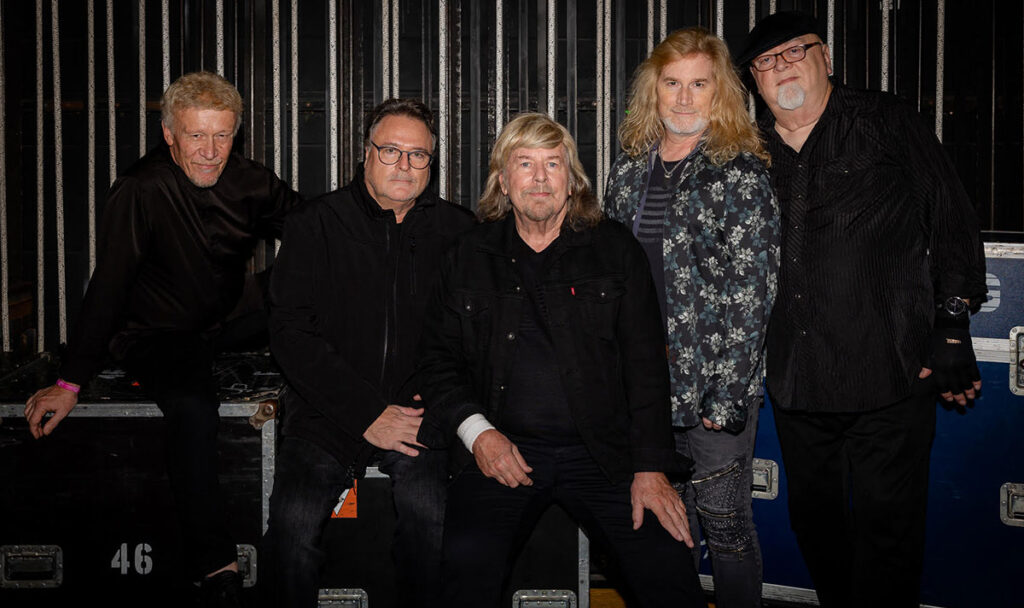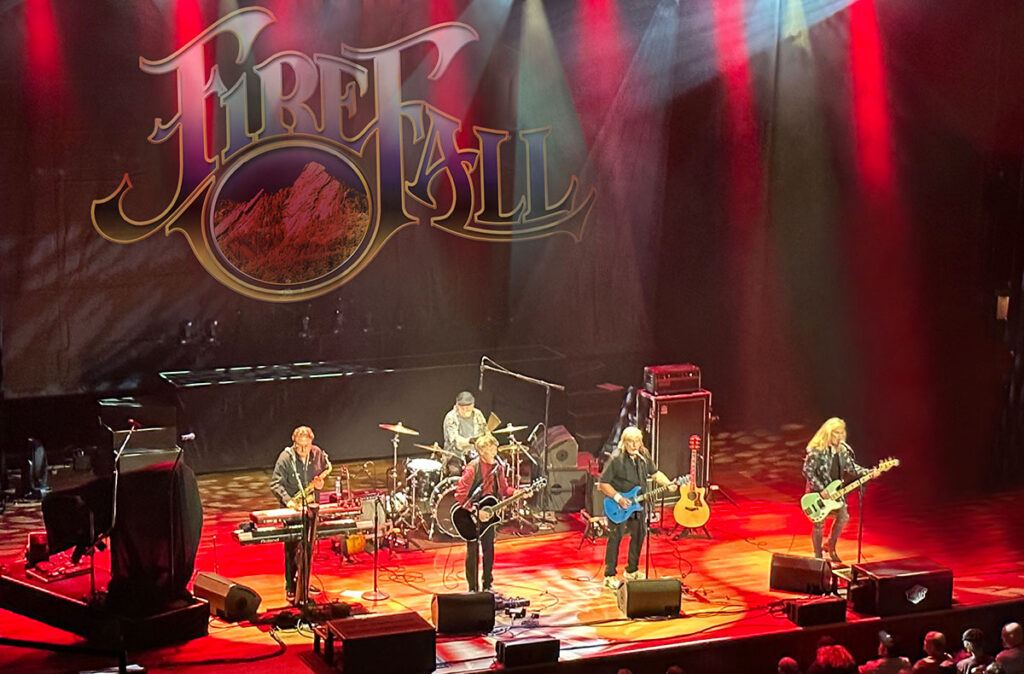
Boulder guitarist Jock Bartley had a memorable stroke of luck at age 23. The manager of a local club told him that Gram Parsons & the Fallen Angels, which included Emmylou Harris, were playing the first show that night of their 1973 tour, and it was possible Bartley could play with them.
Bartley, a hot, young guitar slinger who had replaced the legendary Tommy Bolin in the Colorado-based band Zephyr, went to the club, and his musical resume would soon add another golden element. I’ll let Jock, whose current group Firefall just released Family & Friends, a new album of popular cover songs, set the stage for that night and the historic details.
“I absolutely fell into the gig with Gram Parsons and Emmylou Harris,” he says. “When the GP album (Parsons’s acclaimed first solo album) came out on Warner Bros. Records in 1973, they had to form a touring band and found a drummer and bassist they liked in L.A. But Elvis (Presley) wouldn’t let his great guitarist, James Burton, who played Telecaster all over the GP album, tour with anyone else. Their other choice, the great guitarist Clarence White, was in the Byrds and couldn’t tour either, so Gram hired, at the last moment, an untested guitarist that Emmylou knew.”
Parsons, Harris, the untested guitarist and the rest of the Fallen Angels band then took a long bus ride from Los Angeles to Boulder. Bartley met them at the Boulder club, and they asked him to join them at their second gig at the Pioneer Inn in Nederland, a tiny former mining town with an elevation exceeding 8,100 feet about a 25-minute drive up Boulder Canyon.
In the small rough-hewn-wood bar in Nederland, “I played with the rock and roll opening act, and they heard what I could do,” Bartley recalls. “Then I sat in with the Fallen Angels, knowing none of the songs and not being a country picker. After the gig, the band took a vote. They needed: one, a really good country picker; two, a good rhythm guitar player, and three, a good rock soloist. And I was hired, I was told, because the guitarist they had was zero out of three, and I was two out of three. Ha!”
Bartley immediately hit the road with the band.

“The next morning at 9 a.m.,” he says, “I became the new guy on the bus and learned the songs on the way to Texas, trying to drop the needle on the record as we bumped along in the bus. Our first gig was in Austin, Texas, at the world-famous Armadillo Headquarters, and our second gig was in Houston at Liberty Hall, where Neil Young and Linda Ronstadt walked on stage and sat-in with us! It was the first time Linda and Emmylou ever met or sang together! Later, all three bands — Linda’s, Neil’s and Gram’s — went to Neil’s fancy hotel suite, Gram immediately grabbed Neil’s guitar and started playing dozens of country songs. Emmylou and Linda sat face-to-face near Gram and, with him, blended their amazing voices in harmony for the very first time. Historic and mind-blowing. Song after song. Unbelievable, magical. Maximum quality until nearly dawn.”
Days later, Bartley says, he learned that Led Zeppelin’s Jimmy Page and Robert Plant were in the audience at the Houston show. Bartley also fondly remembers meeting another prominent British musician when the Fallen Angels arrived in New York City.
“Gram’s buddy Dave Mason came, and I had the amazing fortune to jam with him for 15-20 minutes in the dressing room,” Bartley recalls.
In New York, Bartley also met Rick Roberts for the first time. Roberts was Parsons’s replacement in the Chris Hillman-led Flying Burrito Brothers, and Roberts and Bartley would later join together to create Firefall with other musicians.
“Rick Roberts didn’t think I played great country, which I surely did not,” Bartley says. “We both lived in Boulder where he came to see me play in a rock band, and I was smokin’. He kinda stole me from that band, and I was gonna be his guitar player on his third solo album. But as soon as Mark Andes from Spirit started jamming with us, it felt like a band. Rick flew singer-songwriter Larry Burnett out, and, in the first week of practice of this new band with no name or gigs, we had 20-25 originally songs to start with! Unheard of! Some of the first songs we learned — ‘Mexico’, ‘It Doesn’t Matter’, Livin’ Ain’t Livin’’ and ‘Cinderella’ ended up on our first album a year and a half later.”
The instant creativity still astounds Bartley.
“Man!” he exclaims. “Mark and I were in heaven. Soon, Michael Clarke (the Byrds’ original drummer) joined as our drummer, and we made a demo tape of three songs with Chris Hillman producing. That tape, after Warner Bros. said ‘no, landed us our deal with Atlantic Records.”
The Atlantic Records deal also, ironically, might not have happened if Hillman hadn’t become ill.
“Rick, myself and Mark were playing in the Chris Hillman Band, and, when we got to New York City, Chris found out he was seriously ill and had to immediately go home to Colorado,” Bartley recalls. “We Firefall guys offered to fly in Larry and Michael and finish off the two remaining weekend days as Firefall. Atlantic came to see us both nights and offered us a seven-year record contract a few weeks later. Bingo. Fate steps in again!”

Firefall’s self-titled 1976 debut album had three hit singles and was a major success. Among other musicians on the album were David Muse, who played piano, flute, tenor saxophone and other instruments, and noted percussionist Joe Lala. Muse joined Firefall as a full-time member the following year.
Today, Bartley is the only original member in the band. He looks back and says it’s difficult — after playing thousands of Firefall shows since the 1970s — to identify the group’s best show.
“Two tours stand out to me though,” he offers. “Firefall opened for the Band on their final tour before making The Last Waltz movie and breaking up. Wow! To watch Levon Helm, Rick Danko, Robbie Robertson and company play live on stage was totally over the top. The Band was one of the very best groups in American rock history! And, of course, any of the Fleetwood Mac Rumours gigs that we opened for them! They were great, the biggest band in the world at that time. We played in front of huge stadium crowds with Fleetwood Mac, and the absolute electricity was amazing — even when we played! Our biggest show in Colorado was with Fleetwood Mac and Bob Seger in 1977 at Folsom Field in Boulder. Nearly 70,000 hometown/home state fans watched us play. Only three years earlier, Firefall was just starting up, playing at a club called The Good Earth in Boulder in front of a few hundred people. Amazing times!”
Many musicians have impressed or influenced Bartley, so I ask him which album was the best one he ever heard.
“Without question, the best rock and roll band ever is the Beatles,” he says. “I’ve often said my favorite album is Sgt. Pepper’s Lonely Hearts Club Band, which was musically so groundbreaking and unique. But, truly, I think the Beatles’ Rubber Soul is the best album of all time. After Beatlemania had dominated the world early on, the Beatles’ sixth album, released in December 1965, is an album of magnificent simplicity and creativity. The band wanted to create an album with a more organic feel that did not rely on studio effects or electronics but featured straight-forward recordings of the songs they’d written. This album was really when the Beatles matured in the studio, exploring many different styles and colorizations with their instrumentation, including sitar for the first time. The Lennon/McCartney songs on Rubber Soul were incredible: ‘Drive My Car,’ ‘Girl,’ ‘Norwegian Wood,’ ‘Michelle,’ ‘I’m Looking Through You,’ ’Nowhere Man’ and others, along with George Harrison’s ‘If I Needed Someone.’ Wow! Just great great songs, done simply and with the evolving Beatles’ studio magic at a new peak. When one considers that the Beatles wrote and recorded Rubber Soul, Revolver, Yesterday and Today and Sgt. Pepper’s in less than two years, it’s a staggering musical feat that will never be duplicated.”
The Rolling Stones and the Who also influenced Bartley when he was “already playing well” in high school. Another British legend, though, may have had the biggest impact.

“I bought the Fresh Cream album (by Cream), because the cover looked cool,” he recalls. “When I heard Eric Clapton play his first solo, the heavens literally opened for me. Suddenly, it was possible to play like that and not think so much — just ballsy playing! I realized that — other than some rock songs I was learning and playing — pretty much everything I had played for five to six years was written down on paper. Eric was just free-form playing great lead guitar in a bluesy rock fashion. That album kinda changed my soloing outlook! Nobody could sound like Hendrix, but this? Spontaneous emotional playing is what I wanted to do. I bought a fuzz tone and turned up my amp. Interestingly, when I played the cooking one-take solo and licks on ‘Mexico’ (during the recording of Firefall’s first album) at Criteria Studios in Miami, unbeknownst to me, my guitar hero Eric C. was in the control room watching me play! Wow! Unbelievable. It was a very good thing I didn’t know he was in there. If I had known, I’m sure I wouldn’t have been able to play anything at all. Ha!”
Firefall became best known for its hit singles — “You Are the Woman,” “Just Remember I Love You,” “Strange Way” and “Cinderella” — but, to this columnist, the essence of Firefall is not the album versions of the group’s songs. The essence, to me, is the band playing extended versions of the hits in a small club like the Little Bear in Evergreen, Colorado, with Bartley shredding his guitar for long stretches.
“I agree with you,” Bartley responds. “But, of course, I think the essence of Firefall is the songs first and foremost. And the band has always jammed on extended solos live in concert with either guitar, sax or flute. Audiences love to see and hear spontaneous and fun flourishes of musicianship and soloing. As leader of the band, I keep a very tight rein on Firefall to sound like our records on the songs people pay good money to come to hear. But having said that, Firefall is lucky to also be known for those extended and spontaneous solos we get to stretch out on, like ‘Mexico,’ ‘Strange Way’ and ‘Livin’ Ain’t Livin.’”
Firefall’s new Friends & Family album, released Sept. 22, is 100% cover songs.
“The goal of this concept album was to lovingly honor the songs we chose and the bands that originally did them,” Bartley says. “And we acknowledge and honor the amazing time in American music of the late ‘60s through the ‘70s that Firefall had the great fortune to play a small role in. I wanted to stay true to those songs and try to capture some of that magic in our recordings. For the most part, I think we succeeded.”
Some of Bartley’s favorite songs on the album are “Angry Eyes” of Loggins & Messina, Fleetwood Mac’s “World Turning,” Lynyrd Sknyrd’s “Simple Man” and Heart’s “What About Love.”
“It was a difficult choice to pick the Heart song, but our version of ‘What About Love’ — sung so well by our newest member John Bisaha — is one favorite,” Bartley says. “We tried to make it sound a bit like our big ‘70s hit ‘Strange Way.’ I’m very happy with the Loggins and Messina song, which is right in our band’s wheelhouse. As a lead guitarist, it was very cool playing solos and attempting to staying true to great lead guitarists like Toy Caldwell (Marshall Tucker Band), Dan Fogelberg, Lynyrd Skynyrd (guitarists Gary Rossington, Allen Collins and Ed King), Lindsey Buckingham and Randy California (Spirit).”
Might some of the cover songs be too close to the original versions?
“Well, we kept some songs like ‘Part of the Plan’ by Dan Fogelberg very close to the original arrangements,” Bartley responds. “We changed up and went in slightly new directions on other songs like ‘Long Train Running’ by the Doobie Brothers. Our version features a second guitar part over their signature primary rhythm guitar part that Tommy Johnson had played. And we added sax. A lot of this was an experiment, and the songs turned out like they did. I wanted to keep the production of Friends & Family pretty sparse and not add many extras to our respectful renditions of those songs. Keep it simple, and let the songs and vocals speak for themselves.”
